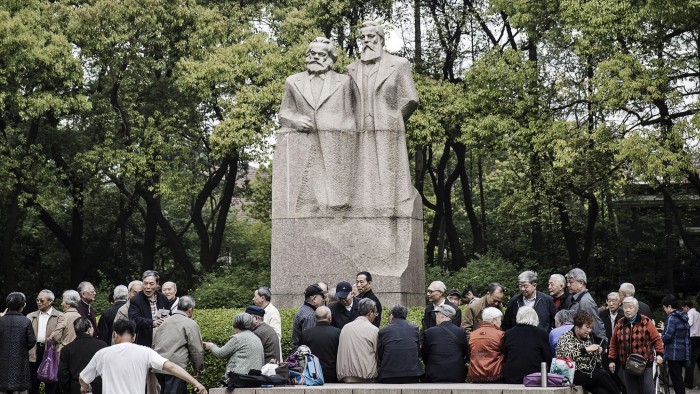Chinese students ‘brainwashed by western theories’, say scholars

Simply sign up to the Chinese politics & policy myFT Digest -- delivered directly to your inbox.
China must stop its university students from being “brainwashed by western theories”, according to a group of Chinese scholars who have urged Beijing to reinstate more Marxism in economics courses.
The rise of western thinking in degree courses, alongside the waning of Marxist content, has “severely deviated college economics education from the socialist direction”, the professors wrote in a letter to the ministry of education.
He Ganqiang, a retired economics professor at Nanjing University of Finance and Economics and one of the letter’s authors, said they had written the letter because “the westernisation of economics was one of the reasons for the Soviet Union’s collapse”.
Although officially communist, China started to abandon centrally planning the economy in the late 1970s and gradually embraced market reforms that have spurred almost four decades of breakneck economic growth.
The letter makes no mention of Karl Marx’s German origins or the fact that he spent much of his life in the UK.
The scholars’ intervention comes amid a broader backlash against western influence in Chinese studies after the education minister last year said textbooks promoting western values had no place in China’s classrooms.
In their letter dozens of professors call for universities to reinstate a 50/50 split between Marxist political economy and western economics in the new academic year.
Beijing is grappling with rising debt and an economic slowdown and is pushing supply-side reforms that have been compared to the policies of Margaret Thatcher and Ronald Reagan in the 1980s.
Last month President Xi Jinping gave a speech in which he called on academics to modernise Marxism to advance China’s development.
Ha-Joon Chang, an economics lecturer at Cambridge university, said: “Marxist economics has shaped the world economy. The architects of the east Asian economic miracles in Taiwan, South Korea and Japan were all schooled in Marxist economics, which sees industrialisation as a way of generating surplus.”
The waning of Marxist influence is not unique to China’s universities. Until the 1980s, it was the norm for economics departments in elite universities such as Harvard and Stanford to have one or two Marxist scholars. However, they have since retired without being replaced.
China’s top economics departments, such as Beijing University’s China Center for Economics Research, have embraced western syllabuses while Renmin University has a department dedicated to translating American economics textbooks into Chinese.
However, moves to limit western thinking in Chinese education are increasingly in vain: more than 300,000 Chinese students moved to the US to study in 2014-15 — a 10 per cent increase from the year before, according to the Institute of International Education.
Additional reporting by Wan Li
Letter in response to this article:
Marxism would clash even more with Chinese culture than western teaching / From Barnaby Powell
Comments